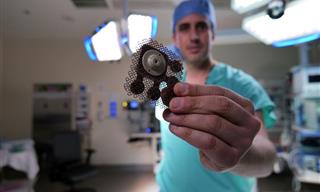A group of scientists from Harvard University, led by Professor Ronald DePinho, have apparently found the Fountain of Youth, and to their surprise, it’s been in our bodies this whole time.
The researchers succeeded in controlling the production of the enzyme Telomere, and according to a report published in Nature – international Journal of Science, they were able to perform, for the first time, a dramatic reversal in aging, including improved fertility, organ recovery and treatment of diseases in mice. The surprising discovery has led researchers, and us, to develop hopes for slowing down the aging process and healing critical illnesses like cancer.

How does the aging process work in our bodies?
To be able to understand this, first we will explain biologically how our body is built; the human body consists of many cells, at first it is a single cell and over time the cells multiply until we reach an adult body consisting of about 40 trillion cells. Each time a cell splits, all the DNA in it is copied, meaning the bundles that make up the cell and carry the hereditary material - the chromosomes. The chromosomes promise that our cells will function properly, for example, heart cells can regulate beats, immune cells can fight against bacteria and viruses and more. But DNA replication is not exactly accurate - each time the cell splits, some of the DNA on the ends of the chromosome erodes and becomes shorter.
The chromosome edges are called telomeres, and their function is to protect it and the hereditary material in the nucleus of the cell, just like the Aglet at the end of the shoelace. Were it not for telomeres, when the cell divides, that is, when the chromosome doubles, the chromosome itself would be shortened and some of its vital genetic information would be lost. In fact, the telomere "sacrifices" itself and shortens itself instead of the genetic material, a sort of "fuse” that eventually ends after the cell multiplies a number of times. Once the telomere is too short, it stops providing protection to the chromosome, and the cell recognizes it as DNA damage and goes into a halt - meaning aging and exposure to disease.

The discovery of "telomerase" and the research of Ronald DePinho
Telomerase is the enzyme responsible for the re-extension of telomeres; it fixes the shortening of the telomere, and was first discovered in a single-celled creature called Tetrahymena, by Elizabeth Blackburn in 1984. But in adult chromosomes, this enzyme is at a very low level or is missing, therefore we age and become susceptible to disease.
To see how this could be corrected, Professor DePinho and his colleagues genetically engineered mice in a way that would allow the researchers to control their telomerase production. When they "shut off" enzyme production, it caused a chain of damage in the mice identified with aging: poor brain function, infertility, gray hair and more. As soon as the researchers "turned on" the enzyme production, they actually returned the substance to activity and the results stunned everyone – as if the clock was rewound, dramatic rehabilitation occurred that included an improvement in their cognitive abilities, the disappearance of gray hair and the return of fertility.

The results of the study and its future implications
The study has shown that worn out old tissues can go back in time, meaning that a destroyed liver can return to its good days and wrinkled skin can become smooth once again. This is a sensational discovery as this is the first time scientist were able to undo aging in living creatures. As for us, humans, our bodies have the ability to regenerate again and again if only you could remove the mechanism that causes it to stop growing old. That is why DePinho believes that his and other researchers' discoveries will, in the future, reduce the rate of deaths from cancer, diabetes, Alzheimer's disease, and other diseases that are characteristic of people over the age of 60.
He believes that instead of fighting these diseases, they can be prevented, and if we can prevent cancer and other diseases in advance, and play with telomeres as we wish, we can extend our lives dramatically. With that being said, the pathway to anti-aging drugs is long, as these medications still need to be tested for long-term effects, but the surprising discovery will undoubtedly lead to a worldwide search for a drug that will activate the regenerative enzyme in our cells.
 Go to BabaMail
Go to BabaMail


























